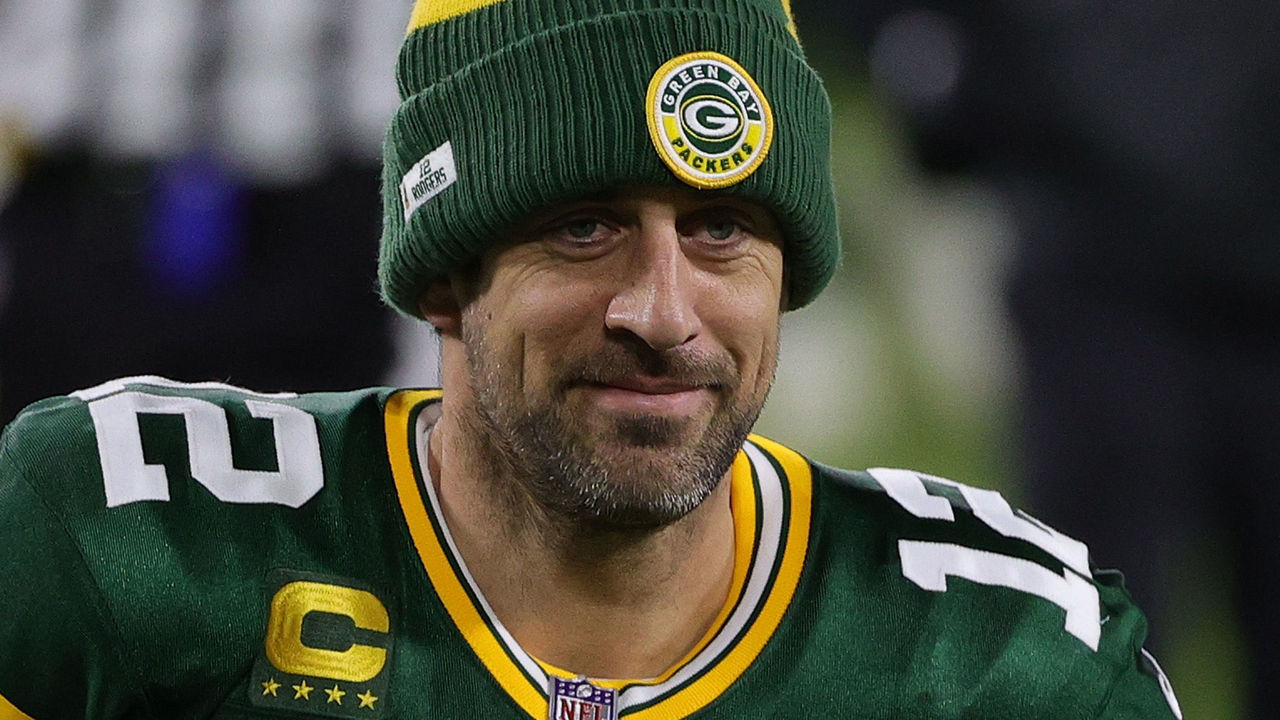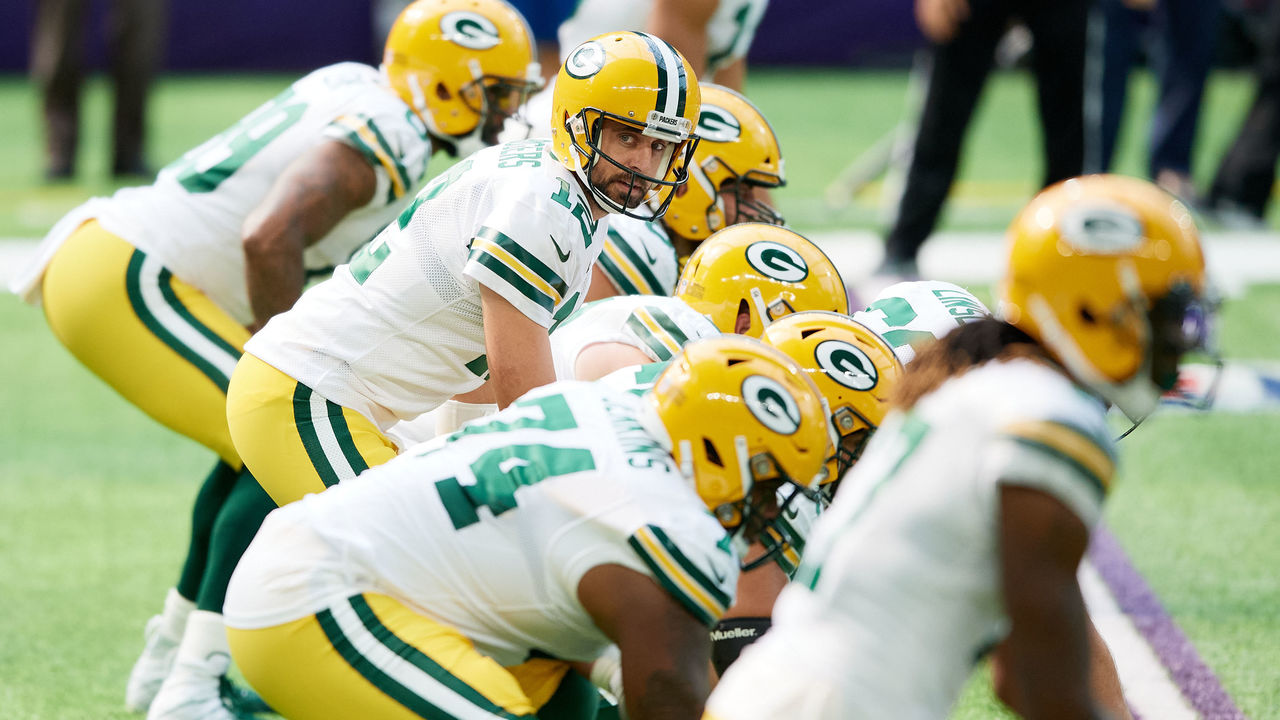How Rodgers has turned back the clock in Year 2 of LaFleur's system
It's safe to say there were questions surrounding the Packers heading into 2020, never mind that Green Bay was coming off a season in which it had tied for the most wins in the NFC, reached the conference championship game, and still had some dude at quarterback named Aaron Rodgers.
"They went 13-3 last season, yet media doubts hung around the team so persistently that then-Packers cornerback Tramon Williams joked in January that they were the 'worst 13-3 team in the world,'" The Ringer's Kevin Clark wrote in October. "This joke was rooted in a handful of analytics pieces that said the team was lucky, fluky, or both despite being one of the final four teams in football last season."
The Packers then went out and traded up in the draft, only to select Utah State quarterback Jordan Love at No. 26. They didn't pick any wide receivers. It looked like Green Bay was preparing for a post-Rodgers future rather than trying to build on its present-Rodgers foundation. None of it has mattered.

Christmas is 10 days away, yet the Packers have already won the NFC North. At 10-3, they're tied with the Saints for the conference's best record, and they hold the tiebreaker over New Orleans because of a head-to-head victory in Week 3. Green Bay's offense has been a howitzer. Rodgers might be 37 and coming off a stretch of seasons in which his usual volume stats overshadowed how inefficient he'd been, but he's having one of the finest campaigns of his Hall of Fame career. He's emerged as an MVP front-runner alongside Chiefs quarterback Patrick Mahomes. Rodgers' embrace of head coach Matt LaFleur's motion-and-play-action-heavy scheme might be the biggest reason why.
The NFL is a passing league, and the Packers right now are one of its premier passing teams. Scoring is at a record high across the league, and Green Bay leads in points per game (31.5), time of possession (33:05), and red-zone efficiency (77.1%) while ranking second to the Chiefs in total yards per game (397.6), yards per play (6.29), and passing yards per game (273.8). Rodgers leads the league in touchdown passes (39), touchdown percentage (8.7), adjusted yards per attempt (9.6), passer rating (119.7), Total QBR (84.8), and adjusted net yards per attempt (9.05).
The advanced stats also illustrate how dominant Rodgers and the Packers have been. He entered Week 14 ranked second to Mahomes in DYAR and QB DVOA, per Football Outsiders, and Green Bay is second to Kansas City in points per drive (3.05). According to Ben Baldwin's database, Rodgers ranks first in expected points added per play (EPA/play) at 0.380 and EPA/dropback at 0.359. He's also first in EPA plus completion percentage over expected (CPOE) at 0.215.

Rodgers has long been considered one of the game's best quarterbacks, and over the summer he still finished third behind Mahomes and the Seahawks' Russell Wilson in The Athletic's Mike Sando's annual QB rankings, which is compiled after polling 50 NFL coaches and evaluators. But Rodgers had shown signs of slippage in recent years: From 2015 to 2019, his EPA+CPOE composite was just 0.106, which ranked 12th, and his EPA/play of 0.157 was only 11th. Last season, Rodgers' Total QBR was a mere 52.5, which placed 20th.
What's changed is the comfort Rodgers has found in his second year in LaFleur's innovative system, which emphasizes the use of pre-snap and at-the-snap motion, in addition to play-action.
Robert Mays of The Athletic noted Rodgers and the Packers had used pre-snap motion on just 30.2% of snaps in 2018, Mike McCarthy's last as head coach. That was the third-lowest total in the league. By Week 7 of this season, the Packers were motioning 59.1% of the time, which was the sixth-most. Rodgers even explained the difference all that motioning has made.
"For us, I think it helps because everything lines up," Rodgers told Mays. "The motions and the actions and the runs and the boots all kind of look the same to start. You've seen it with what the Rams have done and San Francisco. It really does test the gap integrity and the eye discipline of the defense."
In other words, all that pre-snap movement adds another deceptive element to an offense that's already predicated on Rodgers' outstanding ability to complete passes to all levels of the field, in addition to his skill at throwing outside the pocket and on the move.

There is data to back this up. ESPN's Seth Walder and Brian Burke recently determined that at-the-snap motion improves an offense by 0.04 EPA/play on pass plays and 0.08 EPA/play on run plays. Additional research by Josh Hermsmeyer of FiveThirtyEight found teams are averaging 0.22 EPA/play on pass plays in which there is any kind of motion, which is 0.09 EPA/play better than pass plays without pre-snap motion.
Rodgers is getting rid of the ball faster - his average time to throw this season is 2.74 seconds, according to Next Gen Stats. Excluding his injury-shortened 2017 campaign, that's the quickest Rodgers has gotten rid of the ball in the last five years. It's not like he's dinking and dunking, either. Rodgers has 29 completions and 1,117 yards on deep throws (20 air yards or more beyond the line of scrimmage), which is the most in the league, according to PFF. His deep-ball passer rating of 122.7 ranks second. And he throws it long 15.4% of the time, which also ranks second.
Then there's play-action, which adds an additional level of fakery for defenses to process. Rodgers has used play-action on 29.2% of dropbacks, good for eighth-most, according to PFF. He's completed 71.2% of his play-action throws, with 17 touchdowns, zero interceptions, and a league-best 137.2 passer rating. It almost isn't fair.
LeFleur's system combined with Rodgers' all-around ability has done a great deal to scheme open pass-catchers. Per Next Gen Stats, Rodgers has had to attempt a tight-window throw 12.7% of the time, sixth-lowest in the league. And in the red zone? Forget it.
Aaron Rodgers red-zone stats:
— PFF (@PFF) December 14, 2020
🔹 69.6 completion % (1st)
🔹 28 TDs (1st)
🔹 0 INTs pic.twitter.com/VJwUOZ5dVq
"You look back and watch the film, it was like they knew everything that we were doing and they had checks and they had answers for every call that we had," Bears safety Tashaun Gipson told NBC Sports Chicago's Adam Hogue after the Packers wiped the floor with Chicago in Week 13.
There are so many examples of how the Packers blend together the elements of motion, play-faking, and varied formations to thrive. ESPN's Dan Orlovsky breaks down one instance in particular:
Hey now @packers 😍😍😍 🔥 🔥 @GBPdaily #Packers pic.twitter.com/YGmdJL4RIa
— Dan Orlovsky (@danorlovsky7) November 22, 2020
Of course, it helps that Green Bay has one of the league's best offensive lines - the Packers rank first in both pass-block win rate and run-block win rate, per ESPN. Last month, they gave left tackle David Bakhtiari a contract that averages $23 million in annual value - the richest in history for an offensive lineman. It's easy to see why.
Everything the Packers do in the passing game has freed up the run game, too. Running back Aaron Jones is second in DYAR and rushing DVOA to the Titans' Derrick Henry.
It also helps that Rodgers has a dynamic target like wideout Davante Adams, whose 91 catches are fourth-most in the league and who has accounted for 55 receiving first downs - tied for third-most, according to Sports Info Solutions. No other Packer has more than 24 first downs receiving. Just imagine where this offense might be if Green Bay had invested in another wideout for Rodgers in the draft's early rounds.
Still, as Rodgers told Mays, there was a lot to get used to with LaFleur's system, from the alignments and motions to the different route concepts to what sort of cadence he might have to use, not to mention how all of that affected the protections.
"I think a lot of it was learning," Rodgers told Mays. "A lot of it was unlearning too. Some of the things I started my career doing, we started long long ago. The whole West Coast passing game was predicated on precision and timing."
It might have taken some time to get used to, but Rodgers certainly seems to be content with what LaFleur's system is doing for him - and for the Packers. It's the rest of the league that must be uncomfortable.
Dom Cosentino is a senior features writer at theScore.